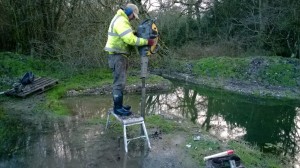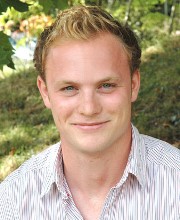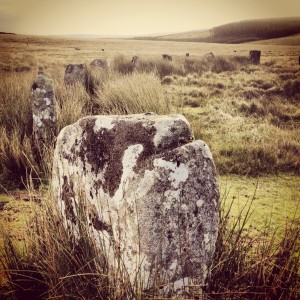Much of the fieldwork that the Quaternary Scientific (QUEST) team conducts is driven and funded by construction and development, often as a requirement of regional planning policy. Inevitably, that means we get a lot of work in London- but we are pleased to have worked on sites elsewhere, including Yorkshire, Northamptonshire, Devon, Suffolk, Somerset, Oxfordshire, Staffordshire and further afield in Jersey, Ireland and France. The type of sites we work on are highly varied- from urban demolition sites to rural Sites of Special Scientific Interest (SSSIs), and we often visit archaeological sites ranging in age from Palaeolithic through to post-medieval. The type of work we do is also varied, and can involve putting down our own boreholes (using petrol-driven power or hand augers), monitoring site investigations (boreholes and test pits), describing sections in trenches, and taking column and bulk samples from archaeological sites.

1. Drilling a borehole on a wet February afternoon next to an archaeological trench, which here more closely resembles a swimming pool! This photo appeared in a Current Archaeology article about the excavation of a Mesolithic occupation site at Blick Mead, Wiltshire- we contributed to the work with a borehole survey across the site, and environmental archaeological assessment of the sequences
In light of all the fieldwork we do, it wasn’t long before we were reminiscing about all the examples of fieldwork – good and bad – that we could share, some stretching back more than ten years, yet etched in our minds for eternity! One particular week seemed to sum up the variety, challenges and joys of Quest fieldwork very well- five days of fieldwork in Dartmoor and London.
Dartmoor National Park
A project in collaboration with the Dartmoor National Park Authority saw us head to Dartmoor for three days of summer fieldwork, equipped with hand corers, sticks and all the enthusiasm that comes with working in a National Park. Setting off at 5am on a Monday morning, we arrived (albeit after getting lost a few times in the Park) keen to get started- our first challenge was to find the site where our boreholes were to be put down. This was no easy task, and as it turned out, was at least an hour’s walk over tors and through (and at times, in!) boggy streams.
When we got there though, it was worth it- the rolling hills of the moors provided a stunning backdrop to our work. After three days of successful borehole survey and collecting samples, although physically drained, we were refreshed from the countryside air and a few days out of the office. The feeling of enlightenment lasted until the long walk back to the car park on the final day- working late to complete the work, we both became exceptionally hungry (thoughts turned from the beautiful scenery to the Burger King at Exeter Services). We persevered though, and made it to the car by around 7pm. Just as we started to take off our wellies, the phone rang- it was the Park Authority conservation officer we were working with- probably calling to congratulate us on a job well done! ‘Hi chaps, I just wondered if you knew you had forgotten to collect the twigs you used to mark your borehole locations?’. We set off back to collect the twigs, leaving the dream of Burger King behind.
Greenwich Peninsula
The sites we visit aren’t always things of beauty- as you can probably imagine, in the heart of East London (especially on a rainy day) they can be quite the opposite! Commissioned to work on a site not far from the Millennium Dome, as part of the impressive redevelopment projects there, we headed to Greenwich Peninsula early one morning after our return from Dartmoor. This morning was no exception- traffic on the M4 – terrible. Traffic on the M25 – terrible. Traffic on the A2 – terrible. And the weather? Terrible. We arrived on time for an early start though- apparently too early for the construction workers on site, who (despite assurances otherwise) had no idea who we were or what we did. Certain demolition sites we work on are described as ‘open access’- usually meaning that they are empty, and can be accessed provided the correct PPE and risk assessments are complete. In this respect, they aren’t really all that different to working out in the middle of nowhere- the lack of facilities and reliance on self-sufficiency remains the same! As it turned out though, this site was anything but accessible- after much deliberation and polite frustration we managed to acquire the correct key to open the correct gate on the correct site. From this point onwards, the fieldwork was a success- within sight of the Dome and the new high-rise blocks springing up (the Peninsula is rapidly changing from the industrial wasteland it once was), the boreholes were collected within a couple of days using our power auger. The samples were returned with us to the laboratory for further analysis, us and our client happy with a job well done.

4. Kev drilling a borehole on the Greenwich Peninsula, within sight of the London Cable Car and Millennium Dome
 About today’s blogger:
About today’s blogger:
Dan Young is Projects Manager for Archaeological Science at Quaternary Scientific (Quest). Quest is the largest enterprise unit offering technical services within the University of Reading. It provides an expert archaeological and environmental science service to archaeological companies, environmental consultancies, government organisations and university researchers. In addition, Quest provides ‘added value’ to SAGES in the form of teaching, technical support and publications. Since 1996, the business has expanded to include a network of specialist and technical staff (internal and external to the University) that service all aspects of contract and research work.
The Quest team is also comprised of:
- Dr Rob Batchelor – Director
- Dr Nathalie Marini – Projects Manager for Environmental Science
- Gemma Lafferty – Commercial Manager
- Kevin Williams – Archaeological Science Technician
- Dr Chris Green – Senior Geoarchaeologist
Quest webpage – http://www.reading.ac.uk/quest/quest-home.aspx





